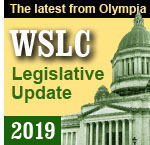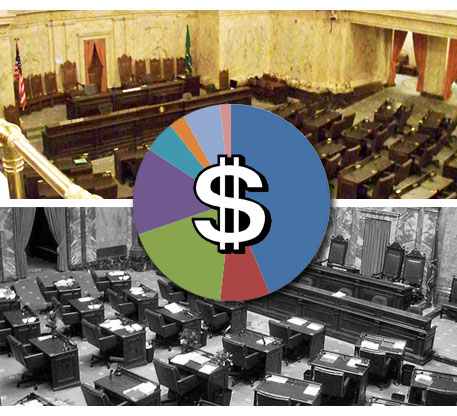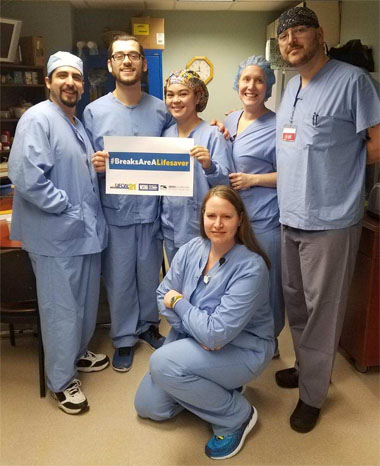STATE GOVERNMENT
Both state budget proposals offer good news for working families
WSLC will continue to push for boost in workforce training, higher ed funding
 This is the latest edition of the weekly Legislative Update newsletter from the Washington State Labor Council, AFL-CIO. If you didn’t receive it via email, subscribe to The Stand and you’ll get the Legislative Updates and all of the WSLC’s other legislative reports.
This is the latest edition of the weekly Legislative Update newsletter from the Washington State Labor Council, AFL-CIO. If you didn’t receive it via email, subscribe to The Stand and you’ll get the Legislative Updates and all of the WSLC’s other legislative reports.
OLYMPIA (April 2, 2019) — Both houses of the Washington State Legislature have now released their budget proposals and they include good news for Washington’s working families. Both the House and Senate plans:
● Fully fund state employee contracts and school employee health care coverage, and maintain public services while accounting for inflation and higher caseloads. (But there is confusion and concern about University of Washington funding and its collective bargaining agreements. Stay tuned.)
● Meet the state’s obligation under McCleary to make major investments in public school funding, thanks largely to additional revenue being generated by our thriving state economy, including a necessary boost for special education.
● Make a significant investment toward improving the state’s behavioral health system.
 On revenue, both budgets propose steps to begin addressing our state’s upside-down, unfair tax system. Both propose taxing extraordinary capital gains (which will only affect the state’s very wealthiest people) and propose to make real estate taxes progressive by lowering them for less expensive homes and raising them for the most expensive homes.
On revenue, both budgets propose steps to begin addressing our state’s upside-down, unfair tax system. Both propose taxing extraordinary capital gains (which will only affect the state’s very wealthiest people) and propose to make real estate taxes progressive by lowering them for less expensive homes and raising them for the most expensive homes.
But each budget has areas of emphasis that surpass the other.
The House makes a more significant investment in higher education — particularly in boosting community college FTEs and competitive pay, including for high-demand instructors — and in job training and workforce education.
The Senate funds necessary oversight of the agricultural H-2A visa program, monitoring of pesticide use, and a Working Families Tax Credit. But in order to save money, the Senate budget makes assumptions regarding staffing needs at various state agencies that raise concerns.
As the two houses debate and amend their budgets — and ultimately, reconcile their differences — the Washington State Labor Council, AFL-CIO will continue to push for the priority budget items sought by its affiliated unions, particularly a significant investment in workforce training and higher education.
Next cutoff deadline: Wednesday
Tomorrow — Wednesday, April 3 — is the cutoff deadline for bills to emerge from policy committees in the opposite house. Here are some of the bills that we’ve been following in the WSLC Legislative Update newsletter and at The Stand that still need to clear that hurdle, plus a status bills on the bills that already have:
WHAT NEEDS COMMITTEE ACTION
 HEALTH CARE: MEAL & REST BREAKS — SHB 1155, sponsored by Rep. Marcus Riccelli (D-Spokane), is patient safety legislation that would ensure frontline healthcare workers receive uninterrupted meal and rest breaks and close a dangerous loophole in the mandatory overtime law. Read more about it. — Passed House, 63-34. In Senate Committee on Labor & Commerce. Hearing held; scheduled for executive action Wednesday.
HEALTH CARE: MEAL & REST BREAKS — SHB 1155, sponsored by Rep. Marcus Riccelli (D-Spokane), is patient safety legislation that would ensure frontline healthcare workers receive uninterrupted meal and rest breaks and close a dangerous loophole in the mandatory overtime law. Read more about it. — Passed House, 63-34. In Senate Committee on Labor & Commerce. Hearing held; scheduled for executive action Wednesday.
HEALTH CARE: PATHWAY TO UNIVERSAL COVERAGE — 2SSB 5822, sponsored by Sen. Emily Randall (D-Bremerton), would set up a work group to make recommendations for publicly funded, privately delivered health care for all Washington state residents. The group will have representatives from various stakeholders in the state’s healthcare system, including from labor with knowledge of Taft-Hartley trusts, and would report its finding and make recommendations to legislators by Nov. 15, 2020. — Passed Senate, 28-21. In House Health Care & Wellness Committee. Hearing held; scheduled for executive action Tuesday.
HEALTH CARE: STANDARDIZED INSURANCE PLANS — ESSB 5526 and E2SHB 1523, sponsored by Sen. David Frockt (D-Seattle) and Rep. Eileen Cody (D-Seattle), aim to increase the availability of quality, affordable private health coverage in the individual market. They would require the state to create a standardized insurance plans and contract with health insurance carriers to offer those plans. — ESSB 5526 passed Senate, 36-13, was heard in Health Care & Wellness Committee; and is scheduled for executive action Tuesday. E2SHB 1523 passed House, 57-41, was heard in Senate Health & Long Term Care; and was scheduled for executive action Monday.
H-2A OVERSIGHT — E2SSB 5438, sponsored by Sen. John McCoy (D), will create some state oversight of the H-2A program, the federal program allows the agricultural industry to bring foreign “guest” farmworkers into the country on temporary work visas. Read more about it. — Passed Senate, 26-21. Heard in House Labor & Workplace Standards; and scheduled for executive action Tuesday.
WORK VIOLENCE / SEXUAL HARASSMENT — ESSB 5258, sponsored by Sen. Karen Keiser (D-Kent), requires companies that employ custodians, security guards, hotel or motel housekeepers, or others who spend a majority of their working hours alone to adopt a sexual harassment policy, provide sexual harassment training, provide a list of resources to employees, and provide panic buttons to isolated workers. — Passed Senate, 47-0. Heard in House Labor & Workforce Standards; and was scheduled for executive action Tuesday. Hearing held. ALSO HB 1056, sponsored by Rep. Gina Mosbrucker (R-Goldendale), would create a task force to identify the role of the workplace in helping curb domestic violence. — Passed House 97-0. In Senate Labor & Commerce. Hearing held.
STATUS REPORT ON THE REST
 UPDATE COLLECTIVE BARGAINING LAWS — SHB 1575, sponsored by Rep. Monica Stonier (D-Vancouver), would update Washington’s collective bargaining statutes to reflect common practices, promote consistency for certifying union elections, assign record-keeping responsibility, and generally bring our state laws into compliance with the Janus decision. Read more about this bill or download this one-pager for more details. — Passed House, 57-41. Passed Senate Labor & Commerce; now in Rules.
UPDATE COLLECTIVE BARGAINING LAWS — SHB 1575, sponsored by Rep. Monica Stonier (D-Vancouver), would update Washington’s collective bargaining statutes to reflect common practices, promote consistency for certifying union elections, assign record-keeping responsibility, and generally bring our state laws into compliance with the Janus decision. Read more about this bill or download this one-pager for more details. — Passed House, 57-41. Passed Senate Labor & Commerce; now in Rules.
ALLOWING AAGs TO JOIN TOGETHER — SSB 5297, sponsored by Sen. Sam Hunt (D-Olympia), would extend collective bargaining rights to assistant attorneys general. Read more about it. — Passed Senate, 27-18. Passed House Labor & Workforce Standards; now in Appropriations.
COLLEGE COUNSELOR STAFFING STANDARDS — ESHB 1355, sponsored by Rep. Lillian Ortiz-Self (D-Mukilteo), would create a joint legislative task force to examine issues related to minimum standards and staffing ratios of counselors in the community and technical college system. — Passed House, 72-24. Passed Senate Higher Education & Workforce Development; now in Rules.
HEALTHY ENVIRONMENT FOR ALL (HEAL) ACT — 2SSB 5489, sponsored by Sen. Rebecca Saldaña (D-Seattle), creating a definition of environmental justice, directing agencies to address environmental health disparities, and creating a task force to recommend strategies for state agencies to incorporate environmental justice principles into their responsibilities. — Passed Senate, 27-21. Passed House State Government & Tribal Relations; now in Appropriations.
INTEREST ARBITRATION FOR CAMPUS POLICE — SB 5022, sponsored by Sen. Karen Keiser (D-Kent), would provide interest arbitration for police officers at four-year colleges and universities. Read more about it. — Passed Senate, 45-2. Passed House Labor & Workplace Standards; now in Appropriations.
INTEREST ARBITRATION FOR CORRECTIONS OFFICERS — 2SSB 5021, sponsored by Rep. Kevin Van De Wege (D-Sequim), would provide interest arbitration for employees at the Department of Corrections. Read more about it. — Passed Senate, 47-0. Passed House Labor & Workplace Standards; now in Appropriations.
KEEP WASHINGTON WORKING ACT — E2SSB 5497, sponsored by Sen. Lisa Wellman (D-Mercer Island). establishes a statewide policy supporting Washington state’s economy and immigrants’ role in the workplace, and ensures their access to state services. It develops strategies to protect our immigrant workforce, and secure their rights as workers and members of our communities. Read more about it. — Passed Senate, 30-16. Passed House Civil Rights & Judiciary; now in Appropriations.
LONG-TERM CARE TRUST ACT — 2SHB 1087, sponsored by Rep. Laurie Jinkins (D-Tacoma), would establish a Long-Term Care Trust to reduce the biggest uninsured risk Washingtonians now face. It will help protect future taxpayers from the cost of long-term care, both to their families and to the state budget. Most of all, it would give families the security of knowing they will get the care they need when they need it most without the added stress of how to pay for it. Read more about it. — Passed House, 63-33. Passed Senate Health & Long-Term Care; now in Ways & Means.
 100% CLEAN ENERGY — E2SSB 5116, sponsored by Sen. Reuven Carlyle (D-Seattle), would transition all electric utilities away from coal-fired power by 2026 and would make all retail sales of electricity greenhouse gas neutral by Jan. 1, 2030. A committee amendment to this bill reflects that tax incentives are tied to important labor standards like prevailing wage, apprenticeship utilization, preferred hire for women, and minority-owned businesses. Also, higher rebates are available for signing a project labor or community workforce agreements. — Passed Senate, 28-19. Passed House Environment & Energy; heard in House Finance; scheduled for executive session Tuesday.
100% CLEAN ENERGY — E2SSB 5116, sponsored by Sen. Reuven Carlyle (D-Seattle), would transition all electric utilities away from coal-fired power by 2026 and would make all retail sales of electricity greenhouse gas neutral by Jan. 1, 2030. A committee amendment to this bill reflects that tax incentives are tied to important labor standards like prevailing wage, apprenticeship utilization, preferred hire for women, and minority-owned businesses. Also, higher rebates are available for signing a project labor or community workforce agreements. — Passed Senate, 28-19. Passed House Environment & Energy; heard in House Finance; scheduled for executive session Tuesday.
PLAN 2 DEFAULT — SB 5360 / ESHB 1308, sponsored by Sen. Steve Conway (D-Tacoma) and Rep. Derek Stanford (D-Bothell), would change the default retirement plan for public workers from Plan 3 to Plan 2, if they fail to choose a plan within 90 days, to ensure more retirees are protected by defined-benefit pensions. — SB 5360 passed Senate, 39-9. Heard House Appropriations; was scheduled for executive action Monday. ESHB 1308 passed House, 74-22. Passed Senate Ways & Means; now in Rules.
REGULATE NON-COMPETITION CONTRACTS — ESSB 5478 and ESHB 1450, sponsored by Sen. Marko Liias (D-Lynnwood) and Rep. Derek Stanford (D-Bothell), would regulate non-competition agreements in Washington state to ensure they aren’t being used to exploit workers and deny them the opportunities to find better jobs. Read more about it. — Both bills were amended. ESSB 5478 passed Senate, 30-18; passed House Labor & Workplace Standards; was pulled from Rules, and is on 2nd reading (available for a floor vote). ESHB 1450 passed House, 55-41; passed Senate Labor & Commerce.
 The WSLC Legislative Update is a weekly newsletter of the Washington State Labor Council, AFL-CIO. It describes legislation of particular concern to Washington’s working families during throughout the state legislative session. Links to previous editions are available here. Additional legislative news is posted at The Stand’s State Government section.
The WSLC Legislative Update is a weekly newsletter of the Washington State Labor Council, AFL-CIO. It describes legislation of particular concern to Washington’s working families during throughout the state legislative session. Links to previous editions are available here. Additional legislative news is posted at The Stand’s State Government section.





